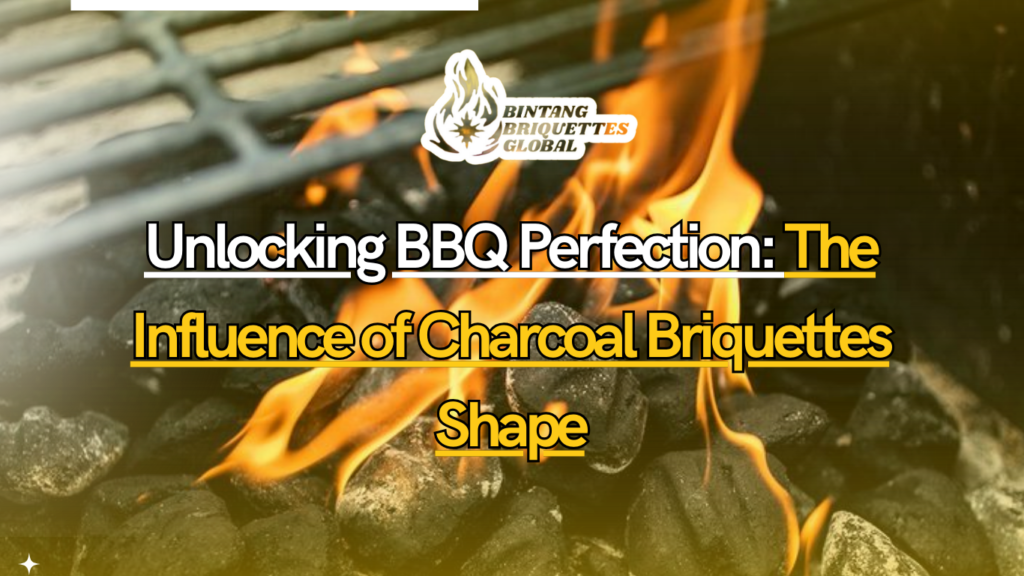Understanding Charcoal Briquettes
What Are Charcoal Briquettes?
bintangbriquettes.com – Charcoal Briquettes Shape are compressed blocks of charcoal made from carbonized biomass—typically coconut shell, wood, or sawdust. They are engineered for consistency, offering a stable and controllable source of heat.
Why Choose Briquettes Over Lump Charcoal?
- Uniform size and shape
- Longer, more consistent burns
- Easier temperature control
- Cleaner and less spark-prone
Common Ingredients
- Carbon (from coconut shells, hardwood, or other biomass)
- Binder (like starch)
- Ignition aid (for quick-light versions)
- Minimal additives for natural variants
The Evolution of Briquette Shapes
Early Shapes
Historically, briquettes were simple pillow shapes—easy to make and stack, but lacking finesse in heat control.
Innovation Driven by Demand
With the rise of high-performance BBQ and shisha use, manufacturers started experimenting with:
- Cubes
- Hexagonal sticks
- Cylinders
- Finger/baton shapes
- Donuts (with a central hole)
- Flats
What’s Driving the Shape Revolution?
- User needs: longer burns, less ash
- Industry adaptation: shisha lounges, BBQ chains
- Efficiency: maximizing airflow and surface contact
How Charcoal Briquettes Shape Affects Heat
1. Airflow
Shapes like hexagonal or donut briquettes enhance airflow between coals, leading to:
- More even burning
- Better temperature control
- Less stalling
2. Surface Area
Flat shapes or briquettes with increased surface area burn faster and hotter, ideal for searing.
3. Stacking Efficiency
Cubes and cylinders are easier to stack for low-and-slow techniques or heat zones.
4. Ash Production
Certain shapes promote more complete combustion, reducing ash buildup that chokes air.
Comparing Popular Charcoal Briquette Shapes
| Shape | Burn Duration | Heat Consistency | Airflow | Best For |
|---|---|---|---|---|
| Cube | Medium | High | Moderate | Shisha, Open Grill |
| Hexagonal | Long | Very High | Excellent | BBQ, Commercial Use |
| Donut | Medium | High | Excellent | Grills, Quick Lighting |
| Cylinder | Long | Moderate | Good | Camping, Smokers |
| Flat | Short | High | Low | Fast Grilling, Searing |
Coconut Shell Charcoal and Shape Innovation
Coconut shell charcoal is naturally dense and produces minimal ash. It performs especially well when shaped into:
- Cubes (for heat consistency)
- Hexagonal sticks (for airflow)
- Donuts (for fast ignition)
- Cylinders (for long burn)
These forms are popular in both BBQ and shisha markets, especially in the Middle East, Europe, and the USA.
How to Choose the Right Charcoal Briquette Shape
For Shisha Use:
- Recommended shape: Cube or hexagonal
- Why: Low ash, long burn, flavor neutrality
For BBQ Use:
- Fast grilling: Use flat briquettes
- Smoking/slow cooking: Hexagonal or cylinder
- Mixed techniques: Donut shape for airflow boost
Additional Considerations:
- Grill type (open, smoker, kettle)
- Cooking method (direct vs indirect)
- Desired cooking time
Heat Zones and Briquette Shape Strategies
Learn how to use different briquette shapes to create:
- Two-zone grilling: Stack hexagonals on one side, flats on the other
- Snake method: Lay cylinders in a coiled pattern for long smoking
- Vortex method: Use cubes in a central ring to concentrate heat
Case Studies – Real-World BBQ Results
1. Memphis BBQ Championship – 2023
Team used hexagonal coconut briquettes for 14-hour pork shoulder. Feedback:
- Zero temp drop
- Low ash
- No bitter smoke flavor
2. Dubai Rooftop Shisha Lounge
Used cube briquettes with wind cover. Outcome:
- Burned for over 90 minutes
- No spark or breakage
- Customers preferred smooth, clean draw
Manufacturing Perspective
How Shape Is Made:
- Molding process (custom molds)
- Compression strength
- Drying and curing method
Quality Checkpoints:
- Dimension tolerance
- Edge sharpness
- Density consistency
Sustainability and Innovation
Coconut shell charcoal is already eco-friendly. But the right shape further improves:
- Efficiency (less fuel for same heat)
- Packaging density (reduces shipping emissions)
- Burn control (avoids waste)
Manufacturers are now combining shape innovation with:
- Carbon-negative processes
- Recycled packaging
- Automated shape testing
Common Mistakes in Shape Selection
- Using flats for long cooks (they burn out fast)
- Mixing quick-light and natural shapes (inconsistent heat)
- Overstacking non-airflow-friendly shapes
Future Trends in Charcoal Briquette Shapes
- Modular shapes for stacking
- Interlocking designs for airflow
- Hybrid core briquettes (dense outside, hollow inside)
- QR-coded packaging with burn guides
Conclusion: Shape Your Fire, Shape Your Flavor
The charcoal briquettes shape you choose is more than a visual difference—it defines how your cook turns out. From heat control to longevity, shape is a vital factor in delivering BBQ perfection or a smooth shisha experience. As more consumers become aware of this, manufacturers are stepping up to create smarter, cleaner, and more efficient briquette designs.
Choosing the right shape? It’s not just science—it’s the secret ingredient to your next unforgettable session.

